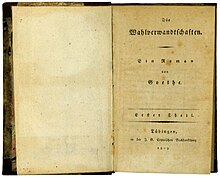Elective Affinities

The title page of the first edition
|
|
| Author | Johann Wolfgang von Goethe |
|---|---|
| Original title | Die Wahlverwandtschaften |
| Language | German (original) English (1854) |
| Publisher | J. G. Cottaische Buchhandlung, Berlin |
|
Publication date
|
1809 |
Elective Affinities (German: Die Wahlverwandtschaften), also translated under the title Kindred by Choice, is the third novel by Johann Wolfgang von Goethe, published in 1809. The title is taken from a scientific term once used to describe the tendency of chemical species to combine with certain substances or species in preference to others. The novel is based on the metaphor of human passions being governed or regulated by the laws of chemical affinity, and examines whether or not the science and laws of chemistry undermine or uphold the institution of marriage, as well as other human social relations.
The book is situated around the city of Weimar. Goethe's main characters are Eduard and Charlotte, an aristocratic couple both in their second marriage, enjoying an idyllic but semi-dull life on the grounds of their rural estate. They invite the Captain, Eduard's childhood friend, and Ottilie, the beautiful, orphaned, coming-of-age niece of Charlotte, to live with them. The decision to invite Ottilie and the Captain is described as an "experiment" and this is exactly what it is. The house and its surrounding gardens are described as "a chemical retort in which the human elements are brought together for the reader to observe the resulting reaction."
Elective Affinities is supposed to be the first work to model human relationships as chemical reactions or chemical processes since the aphorism of the classical Greek philosopher Empedocles: "people who love each other mix like water and wine; people who hate each other segregate like water and oil."
The term "elective affinities" is based on the older notion of chemical affinities. In the late 19th century, German sociologist Max Weber, who had read the works of Goethe at the age of 14, used Goethe's conception of human "elective affinities" to formulate a large part of sociology. In early nineteenth century chemistry, the phrase "elective affinities" or chemical affinities was used to describe compounds that only interacted with each other under select circumstances. Goethe used this as an organizing metaphor for marriage, and for the conflict between responsibility and passion.
...
Wikipedia
